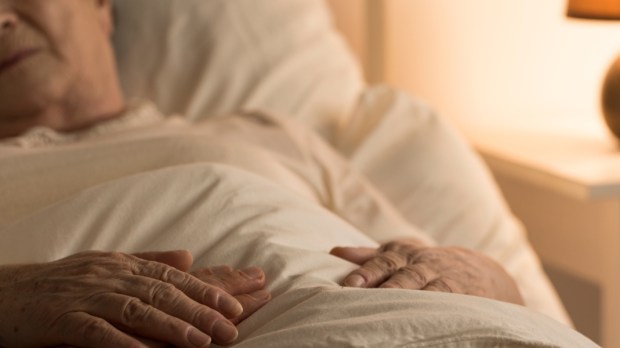When people ask about the type of care the Dominican Sisters of Hawthorne provide for the cancerous poor, it can become a little confusing. One of the reasons is that the destruction of language can cause difficulty. Words often have devolved, not evolved, in the post-modern age.
For example, people will ask if we provide hospice care, and that is where the confusion can begin. Hospice is not just a term that governments, insurance agencies, and hospitals use to designate a type of care that will be paid for and provided for a certain period. Hospice is not a term for data sheets for a business; it is much, much older and richer than that.
Hospice comes from a Latin word for a place of rest and protection for the weary. It was used originally to describe places for those coming home from the Crusades, where they would rest, some of them so worn and weary from battle that they would never leave, their wounds being too grave. It is close in origin to the words host and hospitality. It was also used in France in the 1800s to describe places kept by monks for pilgrims passing through the Alps.
Battle laden
Our patients come to us often weary and battle laden, not from a Crusade, but from the problems that vex us all in life. They have fought battles with cancer, with troubles of addiction and vice, with broken relationships, and a whole host of other foes. Our homes become a place they can lay those burdens down, come close to God Whom they will see soon, and receive healing and peace.
One example is a woman who, even with her dementia, was able to say, “I did not have a happy childhood, and I did not have a happy marriage, but I have been happy here.” And this patient has talked several times of knowing she is waiting here for the time when God brings her home.
A woman who, even with her dementia, was able to say, “I did not have a happy childhood, and I did not have a happy marriage, but I have been happy here.”
Many have been pilgrims, looking for faith, for places of meaningful destination in their lives. Our homes become not only a rest from their pilgrimage, but a pilgrim site itself, where they can find God and others around them who can share the Faith and what it means to be human.
Another example is a woman who traveled much, looking for peace and meaning in her life. Due to various circumstances, she had been excommunicated from the Catholic Church. Our chaplain helped her to resolve the issue, and she came back to her faith after 30 years of absence. She would often comment on how our home was not just a place for her to live her last days with cancer, but a place where she found faith, friendship, and community. “I can feel the love from everyone here.”
Our homes are just that, a home because they are a place where one can be free of the noise of the world for a time, to allow the mind and heart to sort out the truth of life and to live in the present moment well.
Becoming a child again
The term nursing home has also changed. One can read in old nursing journals, or even in an Agatha Christie novel, of people going to a nursing home to receive a “rest cure.” This is hardly the way the term is used now! Our homes are licensed as skilled nursing facilities, but we are much more than what that license suggests. Instead of a home for the infirmed and aged, our homes are a place to become a child again. For it is such as these to whom the kingdom of heaven is given. The fists of some of our patients that were up in defense in a world so harsh, become open and young again, though they may be lined and worn. It is the progressive that says, “you can’t go home again.” It is the Christian child and the child-like that are bold enough to reach for the adventure of heaven.
And mostly, our homes are a true home because they have the Blessed Sacrament at its heart. All the love, peace, joy and healing that takes place in our homes stems not from us, but from His Presence. This is what makes us say our vocation is one on the threshold of eternity.
Living on such a threshold can and should create a sense of true nostalgia. Anthony Esolen puts it best in his book Nostalgia: Going Home in a Homeless World:
Nostalgia is an ache for the journey, that which leads not to the home we have known, but from that home and through that home to the home for which we have been made. It is the sweet heartache of the pilgrim spirit. Its steadfastness is not the desire to remain fixed in one place but to hold to a journey from and through one beloved place to the true and only Beloved.
Our foundress, Mother Mary Alphonsa, started our community to provide a place to ponder the Beloved and to serve Him in the cancerous poor. This type of care enables the Sister and the patient to prepare for this heavenly home together.


